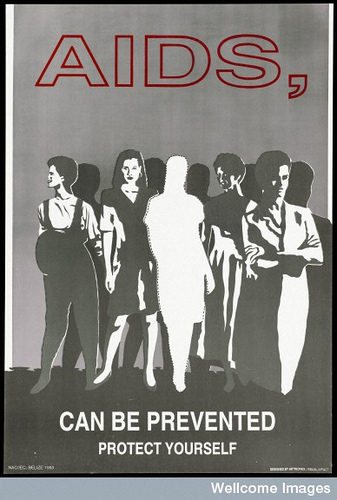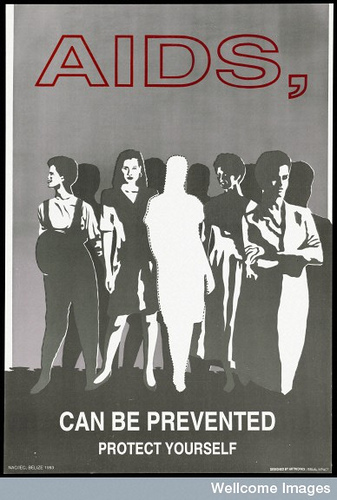AIDS (Acquired Immunodeficiency Syndrome) is the last stage of a progressive, aggressive condition of the human immune system known as HIV (Human Immunodeficiency Virus). HIV is spread through contact with the blood, semen or vaginal fluids of an infected person or by being passed from mother to child during pregnancy. There are 34 million people living with HIV worldwide. The World Health Organization (WHO) estimates that 2.5 million people were newly infected with HIV in 2011 alone. HIV/AIDS is the world’s leading cause of death by infection, having claimed the lives of some 25 million people.
While there is no cure for HIV/AIDS, there are expensive maintenance options that hinder the infections from multiplying in the body and progressing. Sadly, most of those who are infected with HIV/AIDS either do not know it or live in countries where the maintenance options are not available. The sad thing about HIV/AIDS is that it’s almost entirely preventable. We’re going to show you ten ways to safeguard yourself against HIV/AIDS so that you do not become another statistic.
Do not use intravenous drugs.
Sharing needles between infected drug users is one of the leading causes of HIV/AIDS infections. Often times new and sterile needles are not available so addicts rely on needles from other users’ stash to get their fix. You don’t know if the person you’re sharing a needle with is HIV positive. You can’t look at them and tell. Aside from HIV/AIDS, many other blood-borne illnesses are spread by sharing drug needles with infected users as well.

Avoid substances that lead to risky behaviors.
Intravenous drugs are not the only kind that can lead to HIV/AIDS transmission. Even though consuming other kinds of drugs and alcohol that impair your judgment do not directly lead to infection, they can impair you to the point where you may decide to partake in risky behaviors (entertaining prostitutes, having unprotected sex, etc) that you normally would not have partaken of, had you been sober.
Do not have sexual relations with prostitutes.
Prostitutes have some of the highest percentage rates of HIV/AIDS infections in the world. Due to the number of sexual partners they have and lack of adequate medical care, the vast majority of them doesn’t even know they’re infected, yet continue to pass it on to their partners.
Explore monogamy.
Being in a monogamous relationship exponentially reduces your chances of contracting HIV/AIDS. The fewer sexual partners you have, the fewer your chances to become infected.
Use a condom every time you perform a sex act.
Oral sex, vaginal sex and anal sex are all ways that HIV/AIDS can be transmitted. No method of sex is least likely to infect you than another. That’s why it’s imperative that you use a condom every time you participate in sex acts of any kind. Male and female condoms work equally well, assuming they are used correctly.
Get tested regularly.
Even if you’re in a monogamous relationship, get tested for HIV/AIDS on a regular basis. Not only are you keeping yourself safe, you’re also keeping your partner or partners safe as well. Regular testing is beneficial in a number of ways. It helps those who did not know they were infected make informed decisions about their management options and also helps to stop the spread of the diseases.
Insist that your sexual partners get tested regularly, too.
Don’t take their word for it. Ask to see proof of their HIV negative status. Remember that every time you have sex with someone, you’re also having sex with every person they’ve had sex with, every person they’ve had sex with and so on down the line. HIV/AIDS infection could come from any one of those people so it’s better safe than sorry. If they refuse or are reluctant to provide you with proof of their negative status, consider this a red flag and move on to someone who thinks enough of you and themselves to do so.
Abstain from sex.
If you want to be sure you have absolutely 0 chance of contracting HIV/AIDS or any other sexually transmitted disease, abstain from sex. Just because you’ve had sexual intercourse in the past doesn’t mean you cannot take a vow of abstinence. Anyone can choose to not have sex at any point in their life. Abstinence is the only 100% effective method of safe sex.
Educate yourself.
Knowledge is power. When you educate yourself on a subject like HIV/AIDS, it empowers you to make the changes you need to make in order to live a healthier, safer life. Knowing the facts about how the infections are spread greatly reduces the fear and anxiety associated with coming in contact with the diseases. It also greatly reduces your chances of becoming infected because you know what the risk factors are and which things to abstain from.
Educate others.
Educating others about the dangers and methods of prevention associated with HIV?AIDS can go a long way in reducing the infection rates. Once people are aware of the dangers of their actions and know the steps to take to remedy them, they are less likely to engage in those risky behaviors where HIV/AIDS infections flourish. This, in turn, makes the world a safer place for everyone.
You can’t get HIV/AIDS from casual contact with someone. You can’t get it from mosquito bites or from sitting on a toilet – unless bodily fluids are present. You can’t catch it from a cough or a sneeze or by touching a doorknob. There are a lot of misconceptions about HIV/AIDS that can easily be cleared up just by doing a little research.
Taking these precautions and educating yourself on HIV/AIDS puts you back in control of your health. If every person could encourage just one other person to do the same, we could start a trend that could eventually eliminate the spread of the diseases and possibly even eradicate them all together in the very near future. And it all starts with you.
Featured images:
- License: Creative Commons image source
About the Guest Blogger – Author Uttoran Sen is a health care enthusiast who likes to know more about HIV AIDS health care systems. Follow him on Twitter and connect with him on Facebook.

